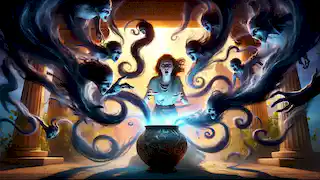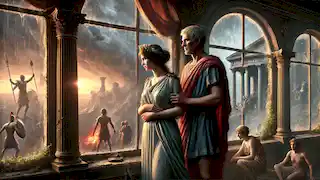Long ago, when the world was new and the gods of Olympus ruled both heaven and earth, there was an age when the lines between mortals and immortals were not as rigid as they are today. During this era, gods often meddled in the lives of men and women, for better or worse. Their favor could bring great blessings, while their wrath could unleash untold horrors. Among these many tales of divine intervention, none is as famous, or as tragic, as the myth of Pandora’s Box—a story of divine punishment, unchecked curiosity, and the unleashing of unimaginable evils upon the world.
In the time after the great Titanomachy—the war in which the Olympians overthrew the mighty Titans—the earth entered a new age. Zeus, the new king of the gods, reigned supreme from his seat atop Mount Olympus. With him ruled his siblings and children, who held dominion over various aspects of the world. Yet while the gods looked down from their lofty thrones, life on earth was much more humble. Men and women lived simple, toilsome lives, governed by the seasons and the forces of nature. It was a life of hardship but also of peace—until the day Prometheus defied the gods.
Prometheus, one of the last remaining Titans who had sided with the Olympians during the great war, had always been a friend to humanity. His name, which meant "forethought," suited him well, for he was both wise and compassionate. Unlike the Olympian gods, who were often distant and indifferent to the plight of mortals, Prometheus saw the potential in mankind. He watched as men struggled to survive in a world filled with darkness and danger. They were vulnerable to the beasts of the night and had no means to defend themselves against the elements.
One night, as Prometheus stood on a mountain overlooking a village, he saw a group of mortals huddled around a pitiful pile of damp wood, struggling to ignite a fire. He saw their shivering bodies, heard their whispered prayers to the gods for warmth and protection, and in that moment, Prometheus made a decision that would change the course of human history. He decided to defy Zeus and bring the gift of fire to mankind.
Fire was a sacred element, the essence of the gods, and it was forbidden for mortals to possess it. But Prometheus could not bear to see humanity suffer any longer. He climbed to the heavens, sneaking into the domain of the sun god, Helios. There, from the chariot of the sun, Prometheus lit a torch with the divine flame and descended back to earth. He delivered the fire to humanity, teaching them how to harness its power, how to build tools, cook their food, and protect themselves from the dangers of the night. With fire, humanity flourished. Villages became cities, and soon mankind was no longer at the mercy of the natural world.
But Prometheus’s act of defiance did not go unnoticed. Zeus, ever watchful from his throne on Olympus, saw the flames burning in the mortal world and knew what had happened. His anger was swift and terrible. How dare a mere Titan defy him, the king of the gods? Zeus’s wrath was not just for Prometheus but also for humanity, for accepting the gift of fire. They had benefited from the power of the gods without paying the price for such a blessing.
And so, Zeus devised a cruel punishment. For Prometheus, he crafted a torment unlike any other. The Titan was bound in unbreakable chains and cast upon a desolate mountain peak. Each day, an enormous eagle—Zeus’s own symbol—would descend from the heavens and feast upon Prometheus’s liver. And each night, the liver would regenerate, only for the eagle to return the next day and repeat the torment. This cycle of eternal suffering was meant to serve as a reminder to all who dared defy the will of Zeus.
But Zeus’s vengeance did not end with Prometheus. He also sought to punish mankind, for they had dared to accept the fire that was never meant for them. Zeus’s plan was devious and subtle. He would not strike humanity down with a bolt of lightning or send a flood to wipe them out, as he had done in the past. Instead, he would craft a punishment that would come from within their own ranks. He would create a being so beautiful and so alluring that mankind would welcome her with open arms—unaware of the destruction she would bring.
This being was Pandora, the first woman, crafted by the gods as both a gift and a curse to mankind. Hephaestus, the god of fire and the forge, was tasked with shaping her form. He crafted her from clay, molding her with such care and precision that she appeared to be alive even before the gods breathed life into her. Her skin was smooth and flawless, her hair as soft as the finest silk, and her eyes sparkled with an unnatural beauty that no mortal could resist.

Once her body was complete, the gods each bestowed upon Pandora their own unique gifts. Athena, the goddess of wisdom, taught her the skills of weaving and craftsmanship, ensuring that she would be both clever and industrious. Aphrodite, the goddess of love and beauty, endowed her with irresistible charm and grace, making her the object of desire for all who laid eyes upon her. Hermes, the messenger god, gave her a cunning and deceitful mind, a quick wit that would allow her to manipulate those around her. And finally, Zeus himself gave her the most dangerous gift of all: curiosity.
Pandora was a marvel to behold. Her beauty and charm were unmatched, and when she was finally brought to life, she was sent down to the mortal world with a dowry—a large, intricately decorated jar. The jar, sealed tightly, was given to her with one strict command: under no circumstances was she to open it. The gods knew that within this jar lay the evils that had been locked away from the world since the dawn of time, evils that were never meant to see the light of day.
Pandora was given in marriage to Epimetheus, the brother of Prometheus. Epimetheus, whose name meant "afterthought," was kind-hearted but somewhat foolish. Prometheus had warned his brother never to accept gifts from the gods, for they often carried hidden dangers. But when Epimetheus saw Pandora standing before him, her beauty so radiant and her smile so sweet, he could not resist. He welcomed her into his home and took her as his wife, unaware of the disaster that was soon to come.

For a time, all was well. Pandora and Epimetheus lived happily together, and Pandora did her best to obey the command of the gods. She kept the jar hidden away in a corner of their home, never touching it or even glancing in its direction. But as the days passed, Pandora’s curiosity grew stronger. The jar seemed to call to her in her dreams, whispering secrets that only she could hear. She began to wonder what could possibly be inside. Why had the gods forbidden her from opening it? What harm could come from simply peeking into its depths?
Pandora tried to resist, but her curiosity became an obsession. She would wake in the middle of the night, staring at the jar, her mind racing with thoughts of what it might contain. Eventually, she could bear it no longer. One fateful day, when Epimetheus was away hunting, Pandora crept over to the jar. Her hands trembled as she reached for the lid, her heart pounding in her chest. She hesitated for a moment, remembering the gods' warnings, but the temptation was too great. With a swift motion, she pried the lid open.
At first, nothing happened. The jar appeared to be empty, and Pandora let out a sigh of relief. But her relief was short-lived. Suddenly, a dark cloud erupted from the jar, filling the room with a foul, oppressive air. From within the jar came a chorus of whispers, moans, and cries—voices of despair that sent shivers down Pandora's spine.
Out of the jar came the very evils that the gods had locked away at the beginning of time: sickness, plague, war, famine, hatred, greed, envy, and death. These spirits swirled around Pandora, their shapes shifting and twisting as they spread out into the world, infecting everything they touched. Pandora could feel their cold, clammy fingers brushing against her skin as they escaped from the jar, and she fell to her knees, overwhelmed with guilt and terror.

She desperately tried to close the jar, but it was too late. The evils had already been unleashed upon the world, and there was no way to recapture them. In her panic, Pandora knocked the jar over, spilling its contents further. But as the jar tipped, she noticed something curious—a small, glowing light remained inside. This was Elpis, the spirit of hope, the one gift left by the gods to temper the horrors that had been unleashed.
Trembling, Pandora reached into the jar and carefully cradled the glowing light in her hands. Though she had released great suffering into the world, she now also held the power to help humanity endure it. Hope was all that remained to counterbalance the evils she had let loose.
Slowly, Pandora closed the jar, sealing it tightly once more. But hope was not meant to be contained. It slipped through her fingers and spread out into the world, following in the wake of the evils that had already escaped. It was a faint light, small and fragile, but it was enough to give mankind
the strength to endure the hardships they now faced.
When Epimetheus returned home, he found Pandora weeping on the floor, the empty jar lying beside her. She confessed what she had done, her voice filled with sorrow and regret. Epimetheus was heartbroken, not only for the suffering that had been unleashed upon the world but also for the pain his wife now carried in her heart. Yet as they held each other in the dim light of their home, they took solace in the knowledge that hope still remained.

From that day forward, the world was forever changed. The evils that Pandora had unleashed spread far and wide, bringing sickness, war, and misery to every corner of the earth. But hope, though small and elusive, lingered in the hearts of men and women. It gave them the strength to endure even the darkest of days, reminding them that no matter how much they suffered, there was always a glimmer of light waiting for them.
The gods watched from Olympus as the world below descended into chaos. Zeus, having seen his plan come to fruition, was pleased. His punishment had been just, and the mortals now understood the dangers of defying the gods. But even Zeus, in all his wisdom, could not have foreseen how resilient humanity would become with hope in their hearts. Though the world was now filled with suffering, it was also filled with the strength to endure it.
Pandora’s name became synonymous with both curiosity and disobedience, a reminder of the dangers of seeking forbidden knowledge. Her story was passed down through the generations, a cautionary tale to those who would follow in her footsteps. Yet it was also a story of redemption, for though Pandora had unleashed great evils upon the world, she had also given humanity its greatest gift: hope.
In the years that followed, Pandora and Epimetheus lived a quiet life, away from the cities that now teemed with strife and discord. Pandora spent the rest of her days trying to undo the harm she had caused, spreading kindness and hope wherever she could. Though she could never fully atone for what she had done, she found peace in knowing that she had given the world a way to endure the suffering she had unleashed.
As the centuries passed, the memory of Pandora’s Box became a symbol of both destruction and salvation. The lid remained tightly sealed, but the lessons it held were not forgotten. The world had changed, but it had not been destroyed. The mortals now knew that the gods could be both generous and cruel, but they also understood that hope was a gift that could outlast even the darkest of curses.

The myth of Pandora’s Box endures to this day, a tale woven into the fabric of human history. It reminds us that even when the world seems bleak and full of suffering, hope still shines as brightly as it did in Pandora’s trembling hands. It is a force that can never be contained, a light that can never be extinguished. No matter what evils may befall the earth, hope will always remain, waiting for us to find it once again.

















